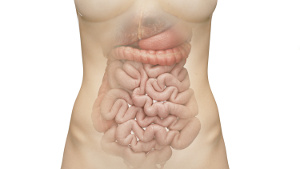B vitamins affect our gut flora
- and vice versa
 All the different B vitamins are of vital importance to our energy levels, nervous system, skin, hair, and health in general. Our daily diet is the primary source of the vitamins but the intestinal flora is able to synthesize, consume, and compete for vitamin B in the host. Interactions between the body and the gut flora is therefore important for how we absorb and utilize the different B vitamins. On the other hand, lack of B vitamins or supplementation with B vitamins can also affect our gut flora, according to a review article that is published in Frontiers in Nutrition.
All the different B vitamins are of vital importance to our energy levels, nervous system, skin, hair, and health in general. Our daily diet is the primary source of the vitamins but the intestinal flora is able to synthesize, consume, and compete for vitamin B in the host. Interactions between the body and the gut flora is therefore important for how we absorb and utilize the different B vitamins. On the other hand, lack of B vitamins or supplementation with B vitamins can also affect our gut flora, according to a review article that is published in Frontiers in Nutrition.
B vitamins are a group of vitamins that are involved in the majority of enzyme processes in the body. They work in a complicated team setup. The absence of one or several B vitamins may trigger a host of different symptoms and diseases such as fatigue, cognitive dysfunction, nervousness, insomnia, constipation, hair loss, cardiovascular disease, thyroids disorders, neuropathy, cardiovascular disease, and osteoporosis. There are also actual deficiency diseases such as beriberi and Wernicke-Korsakoff syndrome (WKS) that are caused by a B1 deficiency, and pellagra that is caused by a lack of B3.
Humans are unable to synthesize B vitamins and therefore depend on getting these nutrients from the diet. Certain bacteria in our gut flora are able to produce small quantities of some B vitamins. The B vitamins that we get from our diet are primarily absorbed from the small intestine with help from transport compounds. B vitamins that are synthesized in our gut flora are primarily absorbed from our large intestine.
Bacteria in our large intestine can make pantothenic acid, biotin, B12, and niacin by converting the amino acid tryptophane. This requires a well-functioning intestinal flora and the quantities are limited. According to the new review article, specific gut bacteria may be able to produce several other B vitamins in small quantities.
Some intestinal bacteria consume B vitamins and that can affect the body’s vitamin B status. B vitamins are involved in a variety of different enzyme processes and vitamin B supplementation may have a positive influence on the diversity, quantity, and function of the gut flora.
Apparently, supplementation with lactic acid bacteria, bifido bacteria, and other probiotics can improve the gut flora’s vitamin B synthesis, thereby counteracting deficiencies. This may be a huge advantage for people who have difficulty with absorbing B vitamins from the diet.
Combining probiotics with B vitamins may deliver a synergistic effect. In their review article, the scientists take a closer look at the different B vitamins, their role in health, and their complicated interaction with the intestinal flora.
The different B vitamins
B vitamins are water-soluble. They cannot be stored in the body (with the exception of vitamin B12) and we must get them from our daily diet. The B vitamins include:
- Thiamin (vitamin B1)
- Riboflavin (vitamin B2)
- Niacin (vitamin B3, nicotinamide/nicotinic acid)
- Pantothenic acid (vitamin B5)
- Pyridoxine (vitamin B6)
- Biotin (vitamin B7)
- Folic acid (vitamin B9)
- Cobalamin (vitamin B12)
B vitamin sources
B vitamins are primarily found in coarse greens, whole grains, oats, vegetables, fruit, nuts, kernels, and rice (brown, black, and red). The dietary fibers contribute to an improved gut flora. There are also B vitamins in liver, meat, fish, eggs, and dairy products. Vitamin B12 is only found in animal food sources.
Vitamin B deficiencies can have many causes
Lack of vitamin B can be caused by poor eating habits, malabsorption, and a disrupted intestinal flora. Because humans are able to store vitamin B12, deficiency symptoms are often insidious and don’t show until several months have passed. For that reason, many older people and vegetarians/vegans don’t immediately link these symptoms to dietary shortcomings. Moreover, alcohol abuse, diuretics, antacids, and various types of medicine used to treat heartburn, diabetes, and epileptic seizures may disturb the body’s absorption and utilization of one or several B vitamins. It is also known that antibiotics and sulfonamides disrupt the gut flora, which can impair the body’s production and absorption of B vitamins.
B vitamin supplementation and optimal utilization
Most multivitamins contain the full vitamin B complex. It is always advisable to buy high-quality products to ensure proper absorption and bioavailability. In the case of deficiencies, choose a strong vitamin B complex. People who have difficulty with absorbing vitamin B12 should take B12 lozenges where the vitamin is absorbed directly in the oral mucosa. As mentioned in the review article, it is a good idea to combine B vitamins with probiotics to strengthen the diversity of the gut flora and its own vitamin B synthesis.
References:
Zhijie Wan et al. Intermediate role of gut microbiota in vitamin B nutrition and its influences on human health. Frontiers in Nutrition, 13 December 2022
Tarmfloraen er nøglen til et godt helbred (netdoktor.dk)
{loladposition myposition80}
- Created on .







